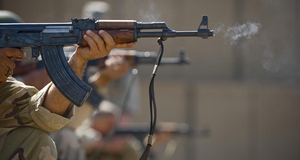The Turkish-Kurdish Conflict in Theory and Practice
By
2014, Vol. 6 No. 03 | pg. 3/3 | « Group Conflict Solution Theories and CriticismsRealistic group conflict theory and others like it, such as Rational Choice Theory, hinder understanding of the Kurdish conflict because they define the conflict on purely material, never intangible, terms (James and Ozdamar, 2009, pg. 27). Marc Ross identifies problems in using these interest-based theories to concoct solutions to ethnic conflict: first, they do not explain how groups define important interests and second, they do not explain why ethnic conflicts become more intense or violent, proportionally, to the so-called interests they seek (Ross, 1995, pg. 524). Ross theorizes then that a psychocultural approach to ethnic conflicts must be used to form peaceful resolution. He proposes that first each involved group must come to accept the other group’s perception of the conflict. Next, the parties must endeavor to lessen the prominence of the fears, mistrust and anger that they feel in order to begin a dialogue (Ross, 1995, pg. 534). Ross suggests that this is possible with the help of an objective third-party (1995, pg. 535). Some critique third party intervention because the party usually consists of elites who have, as Isajiw puts it, a very narrow framework for understanding both sides of the conflict (2000, pg. 109). Where this has indeed been the case, Track II diplomacy has been attempted. Though not perfect, Cuhadar and Dayton attempt to provide a much needed link between theory and practice of peace-making with their revised Track II diplomacy model. Their model consists of 5 steps: find and apply “optimal contact conditions,” provide repetitive contact and dialogue, make a mindful choice between behavioral and cognitive change, generate friendship, and work solely with the in-group to change their perception of the out-group (2011, pgs. 284-186). Their model falls short, as they well know, mainly due to contact. The Social Contact Theory, a theory that underlies many conflict solution models, “focuses on the process of interaction between the conflicting parties themselves,” says Isajiw. He clarifies that only under “favorable” conditions is contact beneficiary and that under any other circumstances, contact may be detrimental. For example, in many ethnic conflicts, deeply rooted threats to the basic human needs of identity and security provide strong psychological barriers that keep conflicting groups from dialoguing about the needs that separate them (Ross, 1995, pg. 5). The Contact Theory is an ideal, but in terms of Turkey, Syria and the Kurdish conflict, one that may never be met. Due to Syria’s support of the PKK and refusal to banish its leader from Syria in 1996 (which caused international strife), Turkey suspended all contact with the Kurds, including the moderate groups (James and Ozdamar, 2009, pg. 26). James and Ozdamar also conclude that the Contact Theory is not applicable to this conflict because policymakers and elites with politicized attitudes are the forerunners of the dialogue, eliminating a Kurdish voice and deeming the problem purely a security issue, rather than an ethnic one.Though this ethnic conflict has, indeed, birthed a security dilemma between Turkey and Syria, the source of the problem is still ethnicity and thus, James and Ozdamar claim that the solution must revolve around ethnic identity (James and Ozdamar, 2009, pg. 31). They thus outline a “philosophical approach” to understanding the conflict and modeling a solution: “systemism.” They spell out a foreign policy model that is systemic, meaning that it considers both “micro” factors like Turkish elite preferences and Kurdish desire for ethnic autonomy, but also looks at “macro” variables, such as Syria’s territorial ambition (James and Ozdamar, 2009, pg. 34). By doing this, they very importantly acknowledge that this domestic ethnic conflict has become internationalized. James and Ozdamar also explain very well the dynamic and fluid dependence that Kurdish ethnicity, Turkish nationalist identity and Syrian foreign policy have on each other. This “system-oriented approach,” they say, explains and “provides a firm foundation for a variety of methodological approaches (2009, pg. 34),” providing the first steps toward a theoretical group conflict model that bridges the gap between understanding of ethnic conflict and conflict resolution. ReferencesBrown, R. (2000). Social Identity Theory: past achievements, current problems and future challenges. European Journal of Social Psychology, 30(6). Retrieved December 5, 2013, from http://onlinelibrary.wiley.com/doi/10.1002/10990992(200011/12)30:6%3C745::AID- EJSP24%3E3.0.CO;2-O/pdf Cuhadar, E., & Dayton, B. (2011). The Social Psychology of Identity and Inter-group Conflict: From Theory to Practice. International Studies Perspectives, 12(3). Retrieved December 9, 2013, from http://onlinelibrary.wiley.com/doi/10.1111/j.1528-3585.2011.00433.x/pdf Isajiw, W. (2000). Approaches to ethnic conflict resolution: paradigms and principles. International Journal of Intercultural Relations, 24. Retrieved December 9, 2013, from http://isites.harvard.edu/fs/docs/icb.topic1230882.files/Approaches%20to%20Ethnic%2 Conflict.pdf James, C., & Ozdamar, O. (2009). Modeling Foreign Policy and Ethnic Conflict: Turkey's Policy Towards Syria. Foreign Policy Analysis, 5(1). Retrieved December 5, 2013, from http://onlinelibrary.wiley.com/doi/10.1111/j.1743-8594.2008.00081.x/pdf Marsella, A. (2005). Culture and conflict: Understanding, negotiating and reconciling conflicting constructions of reality . International Journal of Intercultural Relations, 29. Retrieved December 6, 2013, from http://www.federaleurope.org/fileadmin/files_youngsietar/fileshare/Documents/Papers/Culture_Conflict.pdf Ozcelik, S. (2006). Theories, Practices, and Research in Conflict Resolution and Low-Intensity Conflicts: The Kurdish Conflict in Turkey. Journal of Conflict Studies, 26(2). Retrieved December 5, 2013, from http://journals.hil.unb.ca/index.php/JCS/article/view/4515/5329 Tang, S. (2011). The security dilemma and ethnic conflict: toward a dynamic and integrative theory of ethnic. Review of International Studies, 37. Retrieved December 5, 2013, from the British International Studies Association database. Yegen, M. (2006). Turkish nationalism and the Kurdish question. Ethnic and Racial Studies, 30(1), 119-151. Retrieved December 9, 2013, from the Wake Forest University database. Suggested Reading from Inquiries Journal
Inquiries Journal provides undergraduate and graduate students around the world a platform for the wide dissemination of academic work over a range of core disciplines. Representing the work of students from hundreds of institutions around the globe, Inquiries Journal's large database of academic articles is completely free. Learn more | Blog | Submit Latest in International Affairs |


















